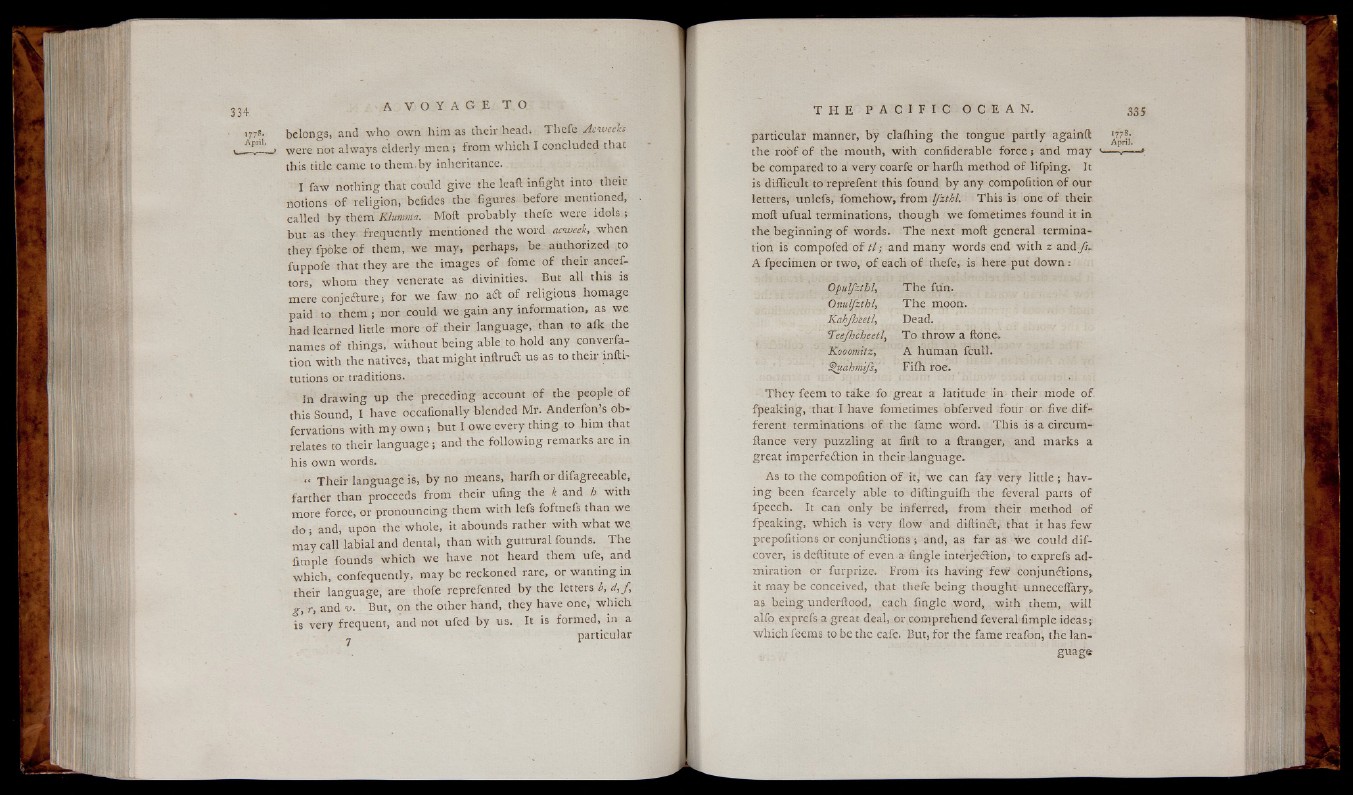
belongs, and who own him as their head. T he fe A ctveeh
were not always elderly m en ; from w hich I concluded that
this title came to them, by inheritance.
I faw nothing that could giv e the leaft infight into their
notions o f religion, befides the figures before mentioned,
called by them Klumma. Moft probably thefe were idols ;
but as they frequently mentioned the word acweek, when
they fpoke o f them, we may, perhaps, be authorized to
fuppofe that they are the images o f fome o f their ancestors,
whom they venerate as divinities. But all this is
mere conjefture; for we faw no a ft o f religious homage
paid to them ; nor could we gain any information, as we
had learned little more o f their language, than to aik the
names o f things, without being able to hold any conversation
w ith the natives, that might inftruft us as to their infti-
tutions or traditions.
In drawing up the preceding account o f the people o f
this Sound, I have occafionally blended Mr. Anderfon’s observations
with my own ; but I owe every thing to him that
relates to their langu ag e ; and the fo llow in g remarks are in
his own words.
it q'heir language is, by no means, harlh or difagreeable,
farther than proceeds from their ufing the k and h with
more force, or pronouncing them with lefs foftnefs than we
do ; and, upon the whole, it abounds rather w ith w hat we
may call labial and dental, than with guttural founds. T h e
fimple founds which we have not heard them ufe, and
which, confequently, may be reckoned rare, or wanting in
their language, are thofe reprefented by the letters b, d , f
g , r, and v. But, on the other hand, they have one, w hich
is very frequent, and not ufed by us. It is formed, in a
particular
particular manner, b y claihing the tongue partly againft l7T^
the roof o f the mouth, with confiderable fo r c e ; and m a y 1---- .—
be compared to a v e ry coarfe or harlh method o f lifping. It
is difficult to reprefent this found by any compolition o f our
letters, unlefs, fomehow, from l/zthl. T his is one o f their
moft ufual terminations, though we fometimes found it in
the beginn in g o f words. T he next moft general termination
is compofed o f t l ; and many words end w ith z andy?.
A Specimen or two, o f each o f thefe, is here put down :
Opulfzthl, T h e fun.
Onulfztht, T h e moon.
Kabjhietl, Dead.
Teejhcheetl, T o th row a ftone.
Kooomitz, A human Scull.
' ^uahmifs, Fiffi roe.
T h e y feem to take So great a latitude in their mode o f
fpeaking, that I have fometimes obferved four or five d ifferent
terminations o f the fame word. This is a circum-
ftance very p u z z lin g at firft to a ftranger, and marks a
great imperfeftion in their languag e.
As to the compolition o f it, w e can fay very lit t le ; havin
g been Scarcely able to diftinguilh the Several parts o f
Speech. It can only be inferred, from their method o f
fpeaking, which is very flow and diftinft, that it has few
prepofitions or conjunctions ; and, as far as w e could discover,
is deftitute o f even a fingle interjeftion, to exprefs admiration
or Surprize. From its having few conjunctions,,
it may be conceived, that thefe being thought unneceflary,
as being underftood, each fingle word, with them, will
alfo exprefs a great deal, or comprehend feveral fimple ideas;:
w hich feems to be the cafe. But, for the fame reafon, the lang
u a g e